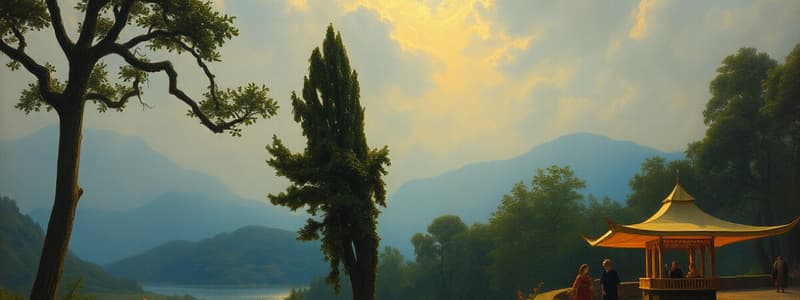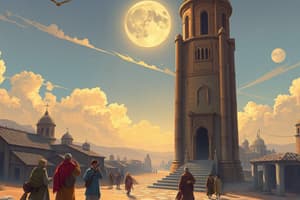Podcast
Questions and Answers
What were the primary reasons for travel during the Renaissance period?
What were the primary reasons for travel during the Renaissance period?
- Travel for pleasure and leisure.
- Travel for education and social status. (correct)
- Trade and economic purposes.
- Self-discovery and exploration.
What led to the rise of spas as popular travel destinations in the 18th century?
What led to the rise of spas as popular travel destinations in the 18th century?
- The rise of recreational travel.
- Government promotion of health tourism.
- Their reputation for therapeutic waters. (correct)
- The development of luxury hotels.
How did the Industrial Revolution influence tourism?
How did the Industrial Revolution influence tourism?
- It made travel exclusive to the upper class.
- It focused solely on international travel.
- It decreased the number of travelers.
- It enabled a larger middle class to afford holidays. (correct)
What was the 'Grand Tour' recognized for during the Renaissance?
What was the 'Grand Tour' recognized for during the Renaissance?
Which cities became key attractions for pleasure-seeking travelers during the Renaissance?
Which cities became key attractions for pleasure-seeking travelers during the Renaissance?
What characterized tourism in the 16th century under Elizabeth I?
What characterized tourism in the 16th century under Elizabeth I?
What does the term 'spa' refer to in the context of travel?
What does the term 'spa' refer to in the context of travel?
Which factor contributed to the emergence of working-class resorts during the Industrial Revolution?
Which factor contributed to the emergence of working-class resorts during the Industrial Revolution?
What primary economic activity motivated early tourism?
What primary economic activity motivated early tourism?
Which civilization is known for extensive travel due to trade as well as the establishment of early tourism?
Which civilization is known for extensive travel due to trade as well as the establishment of early tourism?
How did the invention of certain tools and concepts by the Sumerians facilitate early tourism?
How did the invention of certain tools and concepts by the Sumerians facilitate early tourism?
What were the 'mutations' in the context of Roman travel?
What were the 'mutations' in the context of Roman travel?
What event in Greek history exemplifies travel for private enjoyment?
What event in Greek history exemplifies travel for private enjoyment?
During the medieval period, what contributed to the decline of travel?
During the medieval period, what contributed to the decline of travel?
What was one of the religious destinations for English pilgrims in the 14th century?
What was one of the religious destinations for English pilgrims in the 14th century?
What requirement was established for English pilgrims starting in 1388?
What requirement was established for English pilgrims starting in 1388?
Flashcards are hidden until you start studying
Study Notes
Early Tourism
- Travel and exploration are intrinsic to human nature, prevalent since ancient times, though the term "tourism" emerged in the 19th century.
- The Hebrew word "torah" signifies studying and searching, linking tourism to historical texts, including the Old Testament.
- References to travel and trade in ancient texts include Noah's Ark as a large-scale transport and merchants in Tyre from the Book of Ezekiel.
- Early tourism encompasses business (trading) and religious travel, with merchants traveling for trade across nations.
- Innovations by the Sumerians, such as money, writing, and the wheel, enhanced travel and trade.
- Phoenicians explored the Mediterranean for trading, while Greeks and Romans engaged in travel for business and leisure.
- The Olympic Games (776 BC) and travel among wealthy Romans indicate early forms of tourism for enjoyment and social visits.
- Roman advancements in communication, including roads and inns, facilitated travel, with relay horses covering over 100 miles per day.
- Travel for religious purposes included pilgrimages to holy sites, evolving early passports by 1388 for English pilgrims.
Tourism in the Medieval Period
- Travel experienced a significant decline during the medieval period, remaining burdensome and unsafe post-Roman Empire.
- Roads fell into disrepair, leading to increased danger from thieves, rendering leisure travel nearly nonexistent.
- Travel was primarily limited to crusaders and pilgrims.
Tourism During the Renaissance and Elizabethan Eras
- The Renaissance sparked educational travel, primarily among British students attending emerging universities.
- Travel for education gained popularity in the 16th century, with young men encouraged to tour Europe for enlightenment.
- The concept of a "Grand Tour" emerged, focusing on cultural centers like Venice and Florence, lasting up to three years.
- Pleasure-driven travel surfaced among young men, intertwining educational purposes with social experiences.
- Spas became popular destinations for health, with establishments like Turnbridge Wells drawing those seeking medicinal remedies.
- The term “spa” originates from the Walloon word for "fountain," highlighting the cultural significance of such locations.
Tourism During the Industrial Revolution
- The Industrial Revolution revolutionized tourism through technological and social transformations enhancing recreational travel.
- Increased productivity and urbanization generated a burgeoning middle class seeking leisure opportunities.
- Annual holidays became accessible to more people, leading to growth in working-class resorts near industrial hubs.
Studying That Suits You
Use AI to generate personalized quizzes and flashcards to suit your learning preferences.




